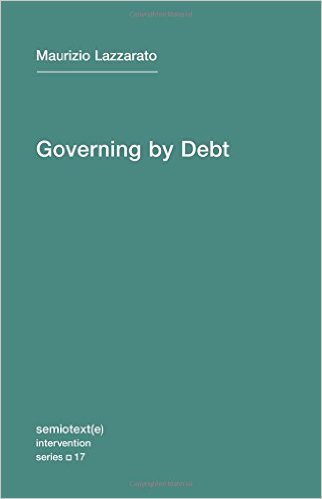
Experts, pundits, and politicians agree: public debt is hindering growth and increasing unemployment. Governments must reduce debt at all cost if they want to restore confidence and get back on a path to prosperity. Maurizio Lazzarato’s diagnosis, however, is completely different: under capitalism, debt is not primarily a question of budget and economic concerns but a political relation of subjection and enslavement. Debt has become infinite and unpayable. It disciplines populations, calls for structural reforms, justifies authoritarian crackdowns, and even legitimizes the suspension of democracy in favor of “technocratic governments” beholden to the interests of capital. The 2008 economic crisis only accelerated the establishment of a “new State capitalism,” which has carried out a massive confiscation of societies’ wealth through taxes. And who benefits? Finance capital. In a calamitous return to the situation before the two world wars, the entire process of accumulation is now governed by finance, which has absorbed sectors it once ignored, like higher education, and today is often identified with life itself. Faced with the current catastrophe and the disaster to come, Lazzarato contends, we must overcome capitalist valorization and reappropriate our existence, knowledge, and technology.
In Governing by Debt, Lazzarato confronts a wide range of thinkers—from Félix Guattari and Michel Foucault to David Graeber and Carl Schmitt—and draws on examples from the United States and Europe to argue that it is time that we unite in a collective refusal of this most dire status quo.
The most influential book of the past seventy-five years: a groundbreaking exploration of everything we know about what we don’t know, now with a new . . .
«Kanskje finnes det for latteren ennå en fremtid!», skriver Nietzsche i åpningen av Den muntre vitenskapen. Med satire og skarpe iakttakelser legger han blant annet . . .
Hvorfor gjør vi feil? Og hvorfor i all verden fortsetter vi å gjøre de samme feilene gang på gang? Vi tenker i ett av to . . .
«The planet is sick. Human beings are guilty of damaging it. We have to pay. Today, that is the orthodoxy throughout the Western world. Distrust . . .
Virilio’s exploration of the relationship between technology, war and information technology. “Civilization or the militarization of science?” With this typically hyperbolic and provocative question as . . .
With this book Paul Virilio inaugurated the new science whose object of study is the «dromocratic» revolution. Speed and Politics (first published in France in . . .
The Believing Brain is bestselling author Michael Shermer’s comprehensive and provocative theory on how beliefs are born, formed, reinforced, challenged, changed, and extinguishedSynthesizing thirty years . . .
«Verden er min forestilling.» Med denne påstanden innleder Schopenhauer sitt hovedverk fra 1818. Alt som kan erkjennes, er objekt for et subjekt. Omvendt gjelder det . . .
Michel Foucault takes us into the first two centuries of our own era, into the Golden Age of Rome, to reveal a subtle but decisive . . .
In this sequel to The History of Sexuality, Volume I: An Introduction, the brilliantly original French thinker who died in 1984 gives an analysis of . . .
Michel Foucault offers an iconoclastic exploration of why we feel compelled to continually analyze and discuss sex, and of the social and mental mechanisms of . . .
There is a catastrophe within contemporary art. What I call the «optically correct» is at stake. The vision machine and the motor have triggered it, . . .
“One day the day will come when the day will not come.” Bleak in its analysis of the social destruction wrought by modern technologies of . . .
Massive technological innovations now allow scientists to extract and analyze ancient DNA as never before, and it has become clear–in part from David Reich’s own . . .
‘Hinsides godt og ondt’ er en hyllest til livet og kreativiteten og på mange måter et endelig farvel med metafysikken. I åpningen sier Nietzsche at . . .
Taboo and sacrifice, transgression and language, death and sensuality—Georges Bataille pursues these themes with an original, often startling perspective. He challenges any single discourse on . . .
How would it be if what we take for human advance were simply a technological progress that literally leaves us out of its equations? What . . .
A trenchant critique of new techniques of waging war, and its reduction to images on a screen Written with his characteristic flair, Virilio’s latest book . . .
With around 645 million people expected to be displaced Ð by wars and other catastrophes Ð by 2050, Virilio begins The Futurism of the Instant . . .
The underlying premise of all of Virilio’s work is that we must analyzespeed and acceleration throughout history and see it as constitutive of historicalepochs. Continual . . .